最新非谓语动词(完整版)
- 格式:doc
- 大小:68.00 KB
- 文档页数:9
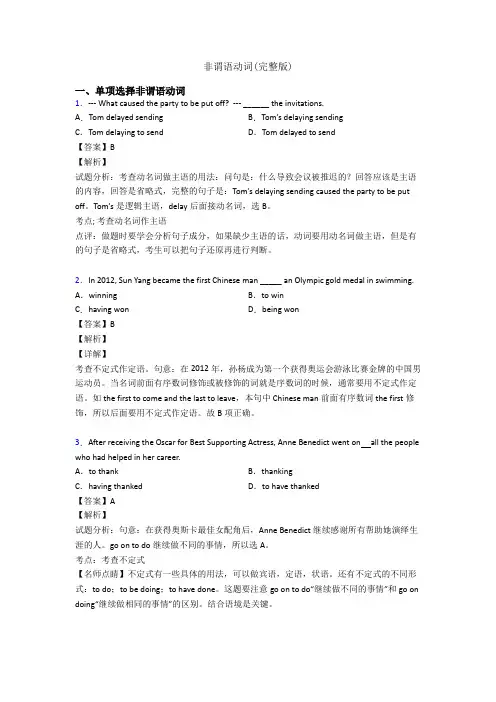
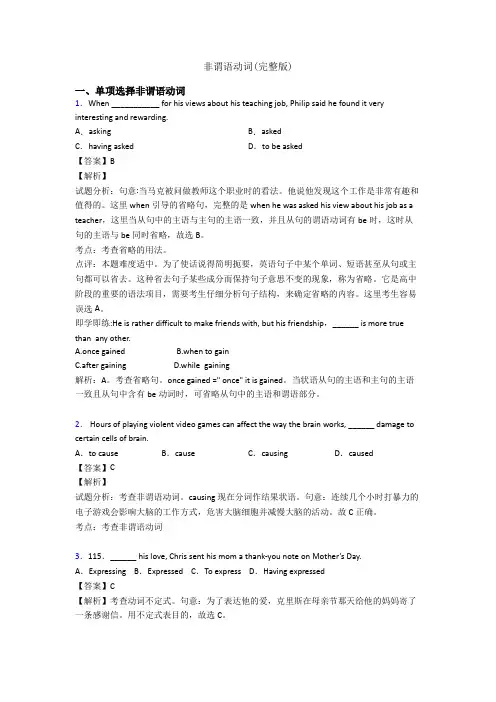
非谓语动词(完整版)一、单项选择非谓语动词1.When ___________ for his views about his teaching job, Philip said he found it very interesting and rewarding.A.asking B.askedC.having asked D.to be asked【答案】B【解析】试题分析:句意:当马克被问做教师这个职业时的看法。
他说他发现这个工作是非常有趣和值得的。
这里when引导的省略句,完整的是when he was asked his view about his job as a teacher,这里当从句中的主语与主句的主语一致,并且从句的谓语动词有be时,这时从句的主语与be同时省略,故选B。
考点:考查省略的用法。
点评:本题难度适中。
为了使话说得简明扼要,英语句子中某个单词、短语甚至从句或主句都可以省去。
这种省去句子某些成分而保持句子意思不变的现象,称为省略。
它是高中阶段的重要的语法项目,需要考生仔细分析句子结构,来确定省略的内容。
这里考生容易误选A。
即学即练:He is rather difficult to make friends with, but his friendship,______ is more true than any other.A.once gainedB.when to gainC.after gainingD.while gaining解析:A。
考查省略句。
once gained =" once" it is gained。
当状语从句的主语和主句的主语一致且从句中含有be动词时,可省略从句中的主语和谓语部分。
2. Hours of playing violent video games can affect the way the brain works, ______ damage to certain cells of brain.A.to cause B.cause C.causing D.caused【答案】C【解析】试题分析:考查非谓语动词。
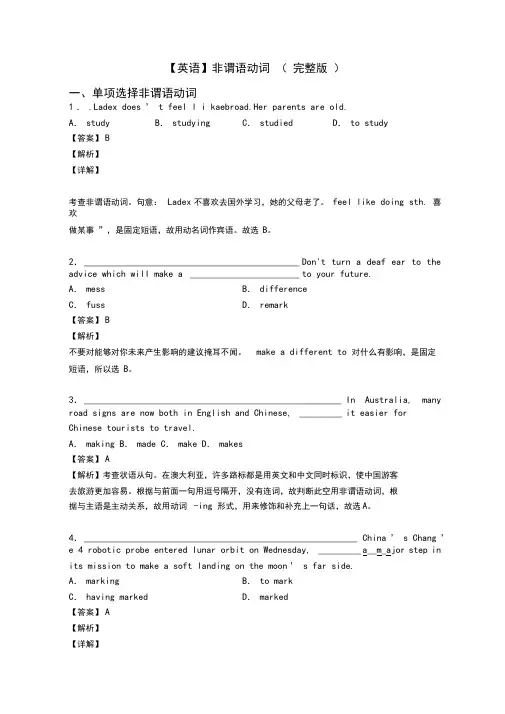
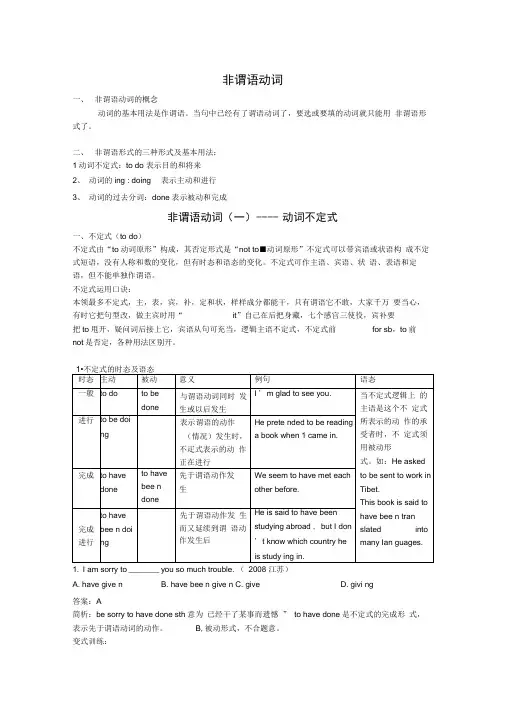
非谓语动词一、非谓语动词的概念动词的基本用法是作谓语。
当句中已经有了谓语动词了,要选或要填的动词就只能用非谓语形式了。
二、非谓语形式的三种形式及基本用法:1动词不定式:to do 表示目的和将来2、动词的ing : doing 表示主动和进行3、动词的过去分词:done表示被动和完成非谓语动词(一)---- 动词不定式一、不定式(to do)不定式由“to动词原形”构成,其否定形式是“not to■动词原形”不定式可以带宾语或状语构成不定式短语,没有人称和数的变化,但有时态和语态的变化。
不定式可作主语、宾语、状语、表语和定语,但不能单独作谓语。
不定式运用口诀:本领最多不定式,主,表,宾,补,定和状,样样成分都能干,只有谓语它不敢,大家千万要当心,有时它把句型改,做主宾时用“it”自己在后把身藏,七个感官三使役,宾补要把to甩开,疑问词后接上它,宾语从句可充当,逻辑主语不定式,不定式前for sb,to前not是否定,各种用法区别开。
1. I am sorry to _______ you so much trouble. (2008 江苏)A. have give nB. have bee n give nC. giveD. givi ng答案:A简析:be sorry to have done sth意为已经干了某事而遗憾” to have done是不定式的完成形式,表示先于谓语动词的动作。
B,被动形式,不合题意。
变式训练:A. have writtenB. have been writtenC. writeD. writing (A)2. The promisi ng young man is said to ____ two no vels.2. 不定式的句法功能1)作主语:( 谓语动词一般用单数 )To finish the work in ten minutes is very hard. 在十分钟内完成这项工作很难。
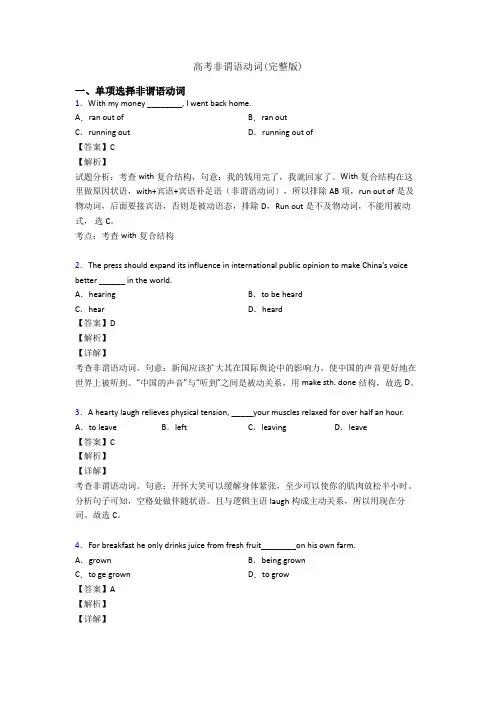
高考非谓语动词(完整版)一、单项选择非谓语动词1.With my money ________, I went back home.A.ran out of B.ran outC.running out D.running out of【答案】C【解析】试题分析:考查with复合结构,句意:我的钱用完了,我就回家了。
With复合结构在这里做原因状语,with+宾语+宾语补足语(非谓语动词),所以排除AB项,run out of是及物动词,后面要接宾语,否则是被动语态,排除D,Run out是不及物动词,不能用被动式,选C。
考点:考查with复合结构2.The press should expand its influence in international public opinion to make China’s voice better ______ in the world.A.hearing B.to be heardC.hear D.heard【答案】D【解析】【详解】考查非谓语动词。
句意:新闻应该扩大其在国际舆论中的影响力,使中国的声音更好地在世界上被听到。
“中国的声音”与“听到”之间是被动关系,用make sth. done结构,故选D。
3.A hearty laugh relieves physical tension, _____your muscles relaxed for over half an hour. A.to leave B.left C.leaving D.leave【答案】C【解析】【详解】考查非谓语动词。
句意:开怀大笑可以缓解身体紧张,至少可以使你的肌肉放松半小时。
分析句子可知,空格处做伴随状语。
且与逻辑主语laugh构成主动关系,所以用现在分词。
故选C。
4.For breakfast he only drinks juice from fresh fruit________on his own farm.A.grown B.being grownC.to ge grown D.to grow【答案】A【解析】【详解】考查非谓语动词作定语。
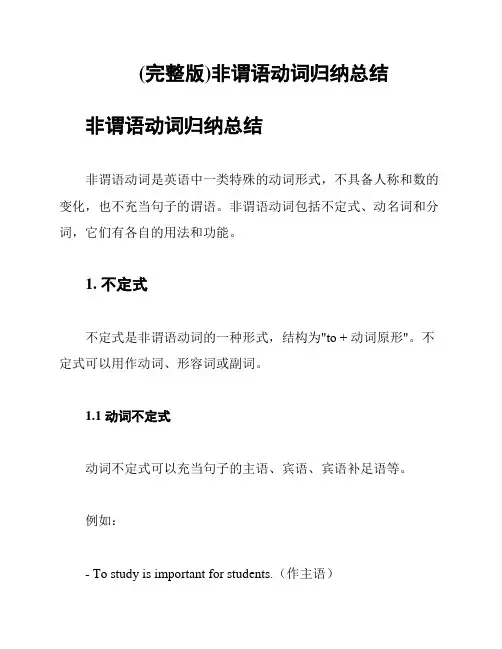
(完整版)非谓语动词归纳总结非谓语动词归纳总结非谓语动词是英语中一类特殊的动词形式,不具备人称和数的变化,也不充当句子的谓语。
非谓语动词包括不定式、动名词和分词,它们有各自的用法和功能。
1. 不定式不定式是非谓语动词的一种形式,结构为"to + 动词原形"。
不定式可以用作动词、形容词或副词。
1.1 动词不定式动词不定式可以充当句子的主语、宾语、宾语补足语等。
例如:- To study is important for students.(作主语)- I want to learn English.(作宾语)- She asked me to help her.(作宾语补足语)1.2 形容词不定式形容词不定式用于修饰名词或代词。
例如:- I have a book to read.(修饰名词)- He is the man to trust.(修饰代词)1.3 副词不定式副词不定式用于修饰动词、形容词或副词。
例如:- She worked hard to pass the exam.(修饰动词)- He is happy to see you.(修饰形容词)- She walked quickly to catch the bus.(修饰副词)2. 动名词动名词是非谓语动词的一种形式,结构为动词的现在分词形式。
动名词可以充当句子的主语、宾语、宾语补足语等。
例如:- Swimming is good exercise.(作主语)- I enjoy playing basketball.(作宾语)- She kept on talking.(作宾语补足语)3. 分词分词是非谓语动词的一种形式,根据时态和完成程度的不同,分词分为现在分词和过去分词。
3.1 现在分词现在分词用于表示主动或进行的动作。
例如:- The running boy is my brother.(作定语)- She stood there, crying.(作状语)3.2 过去分词过去分词用于表示被动或完成的动作。
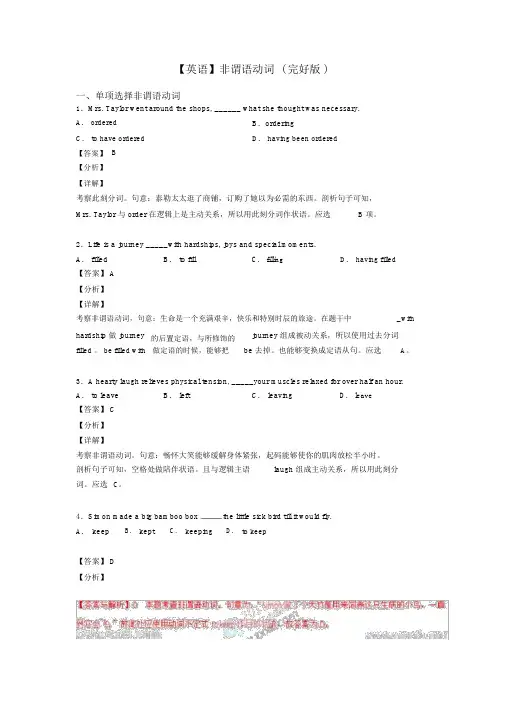
【英语】非谓语动词 ( 完好版 )一、单项选择非谓语动词1.Mrs. Taylor went around the shops, ______ what she thought was necessary.A. ordered B.orderingC. to have ordered D. having been ordered【答案】B【分析】【详解】考察此刻分词。
句意:泰勒太太逛了商铺,订购了她以为必需的东西。
剖析句子可知,Mrs. Taylor 与 order 在逻辑上是主动关系,所以用此刻分词作状语。
应选 B 项。
2.Life is a journey _____with hardships, joys and special moments.A. filled B. to fill C. filling D. having filled【答案】 A【分析】【详解】考察非谓语动词,句意:生命是一个充满艰辛,快乐和特别时辰的旅途。
在题干中_withhardship 做 journey filled 。
be filled with 的后置定语,与所修饰的做定语的时候,能够把journey 组成被动关系,所以使用过去分词be 去掉。
也能够变换成定语从句。
应选A。
3.A hearty laugh relieves physical tension, _____your muscles relaxed for over half an hour. A. to leave B. left C. leaving D. leave【答案】 C【分析】【详解】考察非谓语动词。
句意:畅怀大笑能够缓解身体紧张,起码能够使你的肌肉放松半小时。
剖析句子可知,空格处做陪伴状语。
且与逻辑主语laugh 组成主动关系,所以用此刻分词。
应选C。
4.Simon made a big bamboo box the little sick bird till it would fly.A.keep B.kept C.keeping D.to keep【答案】 D【分析】5.Pressed from his parents, and ____ that he has wasted too much time, the boy is determined to stop playing video games.A.realizing B.realizedC. to realize【答案】 AD. being realized【分析】试题剖析:考察非谓语动词的用法。
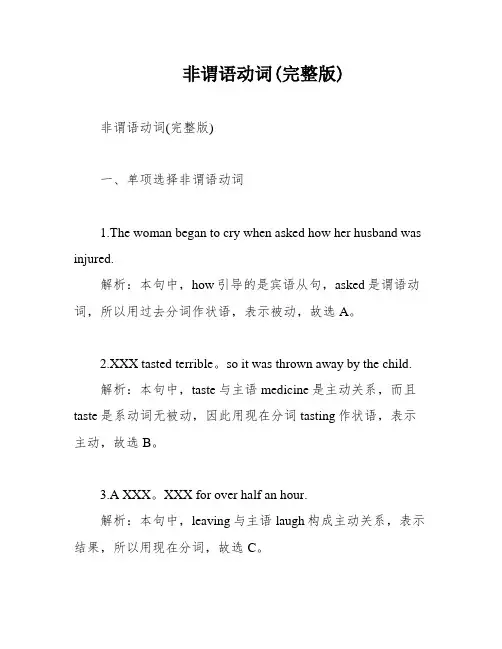
非谓语动词(完整版)非谓语动词(完整版)一、单项选择非谓语动词1.The woman began to cry when asked how her husband was injured.解析:本句中,how引导的是宾语从句,asked是谓语动词,所以用过去分词作状语,表示被动,故选A。
2.XXX tasted terrible。
so it was thrown away by the child.解析:本句中,taste与主语medicine是主动关系,而且taste是系动词无被动,因此用现在分词tasting作状语,表示主动,故选B。
3.A XXX。
XXX for over half an hour.解析:本句中,leaving与主语laugh构成主动关系,表示结果,所以用现在分词,故选C。
4.When asked for his views about his teaching job。
Philip said he found it very interesting and rewarding.解析:本句中,when引导的是省略句,完整的是when he was asked his view about his job as a teacher,这里当从句中的主语与主句的主语一致,并且从句的谓语动词有be时,这时从句的主语与be同时省略,故选B。
二、改写句子1.Being asked how her husband was injured。
XXX.2.XXX.3.A XXX for over half an hour.4.Philip found XXX when he was asked for his views about it.1.The company has decided to implement a new policy to ce the use of plastic bags。
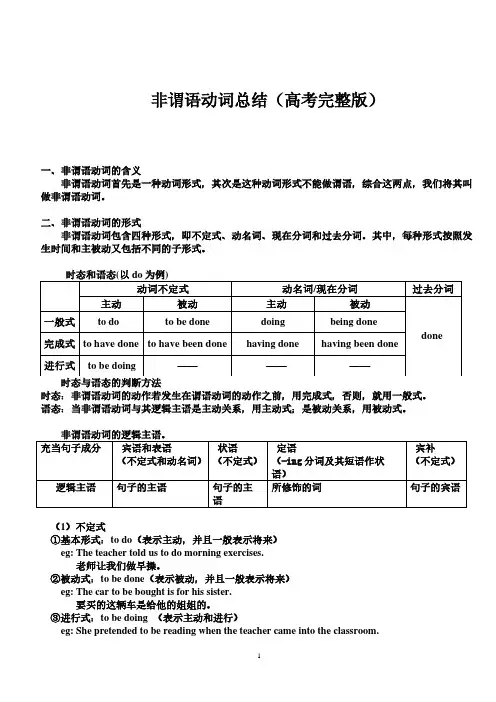
非谓语动词总结(高考完整版)一、非谓语动词的含义非谓语动词首先是一种动词形式,其次是这种动词形式不能做谓语,综合这两点,我们将其叫做非谓语动词。
老师进来时,她假装正在读书。
④完成时:to have done(表示主动和完成)eg: The thief is said to have escaped.据说小偷已经逃跑了。
⑤完成被动式:to have been done(表示被动和完成)eg:The thief is said to have been arrested.据说小偷已经被抓住了。
⑥完成进行式:to have been doing (表示主动和完成进行)eg: She is said to have been working in the factory over the last 20 years.据说在过去的20年里,她一直在这家工厂工作。
(2)动名词①基本形式:doing (表示主动)eg: Travelling in space by ordinary people will be common in the future.在未来,普通人在太空旅行将会是普遍的事情。
②被动式:being done(表示被动)eg: Freddy and his band could go nowhere without being followed by their fans.弗雷迪和他的乐队到哪里都被他们的粉丝跟着。
③完成式:having done(表示主动和完成)eg: I have no idea of his having done such a thing against you.我不知道他做过这样一件违背你的事情。
④完成被动式:having been done(表示被动和完成)eg: Many customers complain of having been given short weight at that shop.很多顾客抱怨在那家商店被缺斤少两过。
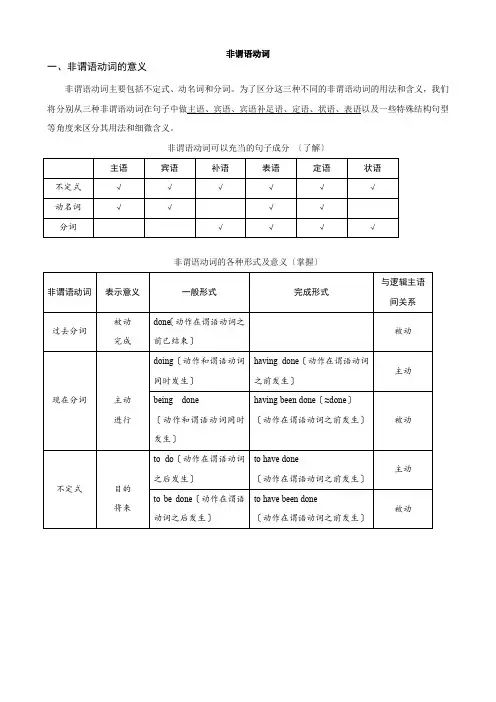
非谓语动词一、非谓语动词的意义非谓语动词主要包括不定式、动名词和分词。
为了区分这三种不同的非谓语动词的用法和含义,我们将分别从三种非谓语动词在句子中做主语、宾语、宾语补足语、定语、状语、表语以及一些特殊结构句型等角度来区分其用法和细微含义。
非谓语动词可以充当的句子成分〔了解〕非谓语动词的各种形式及意义〔掌握〕二、常见非谓语动词的用法上表中列出了各种非谓语动词。
高考中常考的是下表中的七种非谓语动词。
根据非谓语动词与逻辑主语之间的关系,我们可以将高考中常考的七种非谓语动词分类如下:现对这七种非谓语动词举例如下:The tower standing in the center of the square is the symbol of the city.〔现在分词standing作定语,表示主动。
〕Standing in the center of the square, the tower is the symbol of the city.〔现在分词standing作状语,表示主动。
〕The teacher killed in the earthquake is respected by the whole nation.(过去分词killed作定语,表示被动。
) Killed in the earthquake, the teacher is respected by the whole nation.〔过去分词killed作状语,表示被动。
〕The nation being threatened by nuclear radiation is calling for help.〔being threatened作定语,表示被动+进行。
〕Being threatened by nuclear radiation, the nation is calling for help.〔being threatened作状语,表示被动+进行。
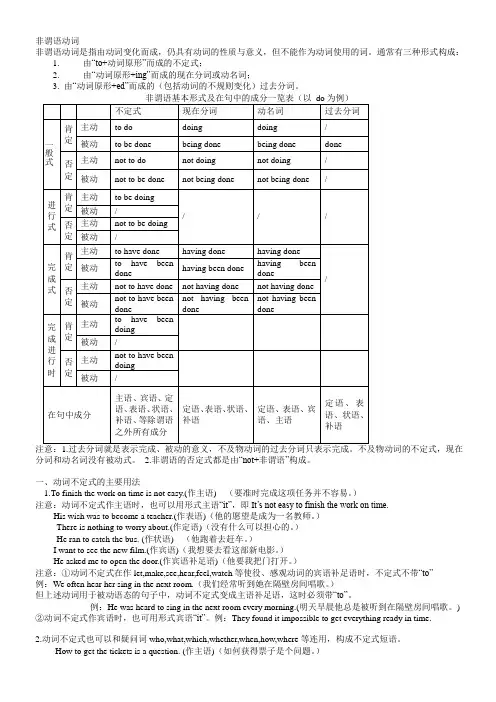
非谓语动词非谓语动词是指由动词变化而成,仍具有动词的性质与意义,但不能作为动词使用的词。
通常有三种形式构成:1.由“to+动词原形”而成的不定式;2.由“动词原形+ing”而成的现在分词或动名词;3. 由“动词原形+ed”而成的(包括动词的不规则变化)过去分词。
分词和动名词没有被动式。
2.非谓语的否定式都是由“not+非谓语”构成。
一、动词不定式的主要用法1.To finish the work on time is not easy.(作主语) (要准时完成这项任务并不容易。
)注意:动词不定式作主语时,也可以用形式主语“it”,即I t’s not easy to finish the work on time.His wish was to become a teacher.(作表语)(他的愿望是成为一名教师。
)There is nothing to worry about.(作定语)(没有什么可以担心的。
)He ran to catch the bus. (作状语) (他跑着去赶车。
)I want to see the new film.(作宾语)(我想要去看这部新电影。
)He asked me to open the door.(作宾语补足语)(他要我把门打开。
)注意:①动词不定式在作let,make,see,hear,feel,watch等使役、感观动词的宾语补足语时,不定式不带“to”例:We often hear her sing in the next room.(我们经常听到她在隔壁房间唱歌。
)但上述动词用于被动语态的句子中,动词不定式变成主语补足语,这时必须带“to”。
例:He was heard to sing in the next room every morning.(明天早晨他总是被听到在隔壁房间唱歌。
)②动词不定式作宾语时,也可用形式宾语“it”。
例:They found it impossible to get everything ready in time.2.动词不定式也可以和疑问词who,what,which,whether,when,how,where等连用,构成不定式短语。
非谓语动词归纳总结一,非谓语动词的形式变化及其意义二,非谓语动词的运用及考题形式形式1,(If/Unless/When/Though/As)( )----------------------,句子(主语+谓语+宾语-----)(1)To do-----表目的(为了),发生谓语动词后,后面常带宾语(2)Doing/Having done----(当---时,如果,虽然,因为),后面常带宾语(3)Done/Having been done----(当---时,如果,虽然,因为),后面不带宾〖注意〗:1,(Do )---------------, and/but/or/if/when/before/after+主语+谓语+--------这是祈使句,所以用动词原2,(Doing/Being done)------------------is/was(谓语动词)-----------------------------------.这是用动名词作主语〖例证〗:1,______(look)carefully,and you can find the differences between the two pictures.2,______(look)after his aged mother, he gave up the chance to go abroad for further study.3,_______(look) after yourself well is important when you are alone abroad.4,_______(look) after well by the nurse, the old man recovered quite quickly.5,_______(look) after well is a kind of love that our parents gave us.6,_______(look) for the book for a long time, he finally bought it in a bookstore occasionally.7,_______(look) after well by the nurse for two months,the old man finally recovered.形式2主语+谓语+宾语+------,()+------------1,doing(及物动词后面跟宾语)表示伴随,结果,方式2,done(及物动词后面不跟宾语)表示伴随,结果,方式3,only to do表示结果〖例证〗1,A hearty laughter releases physical tension, ( )(leave) our muscle relaxed for half an hour. 2,The old grandma got off the bus, ()(support)by her granddaughter.3,We hurried to the railway station, only( )(find) the train had already left.4,He got up,washed his faces,had his breakfast, and( )(go) to work.形式3主语()+ 谓语+ 宾语()+-------------1,to do将要做的to be done将被做的(作定语或宾语补足语)2,doing正在做的being done正在被---的(作定语或宾语补足语)3,done被----了的(作定语或宾语补足语)〖例证〗1,Anyone________(see)________(carry)bags,boxes,cases was stopped by the police.(作定语)2,Steam can be seen__________(rise) when water is heated.(作主语补足语)3,Seeing the roads _____(cover) with snow and ice, we decided to stay at home.(作宾语补足语)4,The building _________(complete) next month will be used as a laboratory.(作定语)5,The problem______(discuss) now is not the one _____(discuss)at yesterday’s meeting (作定语)6,He spoke loudly enough to make himself __________(hear) clearly.(作宾语补足语)7,The government has taken effective measures________(improve) the air condition in Beijing.(作目的状语)8,Don’t keep the water ________(run) when you brush teeth.(作宾语补足语)三,固定搭配1,跟不定式作宾语的动词Aim,appear,agree,arrange,decide,choose,demand,desire,determine,expect,hope,fail,happen, hesitate,learn,mean,manage,offer,plan,prepare,pretend,promise,refuse,attempt,want2,跟动名词作宾语的动词Consider,suggest,advise,excuse,pardon,admit,delay,putoff,fancy,avoid,miss,keep,practice,deny,finish,enjoy,appreciate,can’t help,forbid,imagine,risk,mind,allow,permit,escape3,to后面跟动名词的短语Be/get used to,be related to,be addicted to,be opposed to,be devoted to,be adjusted to,be connected to,be compared to,lead to,object to,look forward to,stick to,pay attention to,contribute to,make contributions to,reply to,turn to,belong to,respond to。